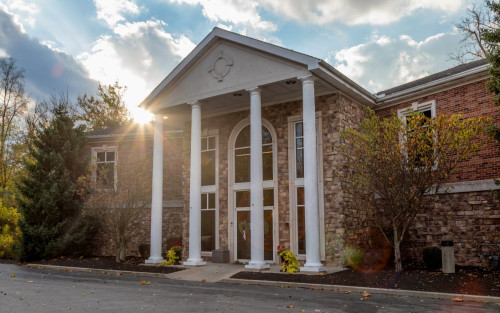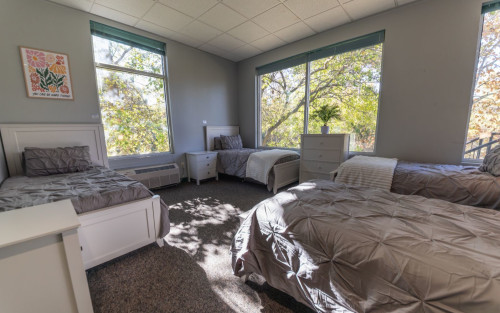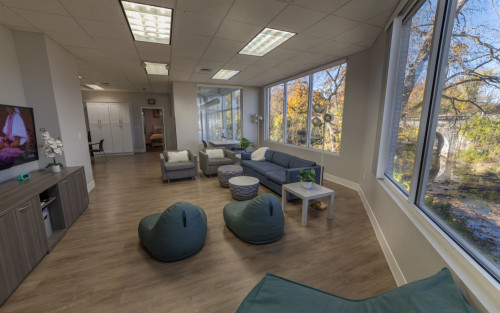






Aster Springs Ohio
Treatment Focus
You can get treatment for eating disorders at this center, helping you navigate symptoms, build coping tools, and restore your physical health under expert care.
Primary Level of Care
Offering intensive care with 24/7 monitoring, residential treatment is typically 30 days and can cover multiple levels of care. Length can range from 14 to 90 days typically.
Claimed
Recovery.com has connected directly with this treatment provider to validate the information in their profile.
Treatment Focus
You can get treatment for eating disorders at this center, helping you navigate symptoms, build coping tools, and restore your physical health under expert care.
Primary Level of Care
Offering intensive care with 24/7 monitoring, residential treatment is typically 30 days and can cover multiple levels of care. Length can range from 14 to 90 days typically.
Insurance Accepted
This center accepts insurance, exact cost can vary depending on your plan and deductible.
Aster Springs Ohio
Aster Springs Ohio
About Aster Springs Ohio
Tailored Treatment Plans
Aster Springs, formerly known as Toledo Center for Eating Disorders, provides treatment for children 10+, teens, and adults of all genders suffering from eating disorders such as anorexia nervosa, bulimia nervosa, and ARFID. Toledo Center for Eating Disorder’s mission is to provide specialized, cost effect treatment. They believe each client's eating disorder and life experience are unique, therefore they provide customized treatment plans for each individual. Tailored treatment plans help navigate the journey to recovery. At Toledo Center, we firmly believe that a welcoming and inclusive environment for all, regardless of gender and sexual orientation, is crucial to recovery and healing. Their adolescent residential program offers a high level of structure, safety, and monitoring. Toledo Center for Eating Disorders provides a safe and comfortable living environment where clients receive 24-hour care, 7 days a week. Adolescents receive assistance from staff members conducting daily living activities such as personal hygiene, medications, and self-responsibility for keeping their rooms clean and neat. The residential program includes medical and psychiatric supervision and evidence-based clinical interventions to help process underlying issues related to eating disorders. Clients participate in individual, group, and family therapy with an emphasis on meal planning, symptom reduction/elimination skills, and relapse prevention. In addition to the treatment program, they also offer training on emotional skills, social skills, assertiveness, and stress management techniques.
Tree Line Campus
Toledo Center for Eating Disorders is located on private property near Sylvania, Ohio. Clients can hear the calming sounds of the beautiful Mill Creek that rushes by the campus. The beautiful stone campus is surrounded by trees offering a peaceful, tranquil setting. The campus is fully furnished, and each bedroom comes with a fun and unique design. Toledo Center for Eating Disorders is a well-rounded treatment center, complete with a caring, supportive staff. Treatment length ranges from 6 to 8 weeks, and Toledo Center for Eating Disorders accepts most private insurance.

Center Overview
Treatment Focus
You can get treatment for eating disorders at this center, helping you navigate symptoms, build coping tools, and restore your physical health under expert care.
CARF Accredited
CARF stands for the Commission on Accreditation of Rehabilitation Facilities. It's an independent, non-profit organization that provides accreditation services for a variety of healthcare services. To be accredited means that the program meets their standards for quality, effectiveness, and person-centered care.

Insurance Accepted
Cash Pay Rates
Estimated Cash Pay Rate
Center pricing can vary based on program and length of stay. Contact the center for more information. Recovery.com strives for price transparency so you can make an informed decision.
Meet Your Care Team

Olivia Dunbar
Executive Director
LISW-S

Alicia Winne
Clinical Director
MSW, LISW

Abbey Boston
Director of Nursing

Chrissy Hall
Group CEO
LCSW
Levels of Care





Your Care Options
Specializations
Co-Occurring Disorders
A person with multiple mental health diagnoses, such as addiction and depression, has co-occurring disorders also called dual diagnosis.
Adolescents
Teens receive the treatment they need for mental health disorders and addiction, with the added support of educational and vocational services.
Children
Treatment for children incorporates the psychiatric care they need and education, often led by on-site teachers to keep children on track with school.
Eating Disorders
An eating disorder is a long-term pattern of unhealthy behavior relating to food. Most people with eating disorders have a distorted self-image.
Who We Treat
Men and Women
Men and women attend treatment for addiction in a co-ed setting, going to therapy groups together to share experiences, struggles, and successes.
Adolescents
Teens receive the treatment they need for mental health disorders and addiction, with the added support of educational and vocational services.
Children
Treatment for children incorporates the psychiatric care they need and education, often led by on-site teachers to keep children on track with school.
LGBTQ+
Addiction and mental illnesses in the LGBTQ+ community must be treated with an affirming, safe, and relevant approach, which many centers provide.
Approaches
Evidence-Based
A combination of scientifically rooted therapies and treatments make up evidence-based care, defined by their measured and proven results.
Individual Treatment
Individual care meets the needs of each patient, using personalized treatment to provide them the most relevant care and greatest chance of success.
Therapies
1-on-1 Counseling
Patient and therapist meet 1-on-1 to work through difficult emotions and behavioral challenges in a personal, private setting.
Family Therapy
Family therapy addresses group dynamics within a family system, with a focus on improving communication and interrupting unhealthy relationship patterns.
Acceptance and Commitment Therapy (ACT)
This cognitive behavioral therapy teaches patients to accept challenging feelings and make the appropriate changes to reach personal goals.
Nutrition Counseling
Nutritious food helps patients heal from within, setting them up for mental and bodily wellness as they learn about healthy eating.
Experiential Therapy
With this approach, patients heal by doing. Therapists help patients process difficult emotions to speak, using guided activities like art or dance.
Conditions We Treat
Post Traumatic Stress Disorder
PTSD is a long-term mental health issue caused by a disturbing event or events. Symptoms include anxiety, dissociation, flashbacks, and intrusive thoughts.
Anxiety
Anxiety is a common mental health condition that can include excessive worry, panic attacks, physical tension, and increased blood pressure.
Depression
Symptoms of depression may include fatigue, a sense of numbness, and loss of interest in activities. This condition can range from mild to severe.
Trauma
Some traumatic events are so disturbing that they cause long-term mental health problems. Those ongoing issues can also be referred to as "trauma."
Eating Disorders
An eating disorder is a long-term pattern of unhealthy behavior relating to food. Most people with eating disorders have a distorted self-image.
Substances We Treat
Co-Occurring Disorders
A person with multiple mental health diagnoses, such as addiction and depression, has co-occurring disorders also called dual diagnosis.
Languages
Aftercare
Care Designed for Your Needs
Personal Amenities
Amenities
Special Considerations
Healthy Meals are provided
Great food meets great treatment, with providers serving healthy meals to restore nutrition, wellbeing, and health.
Activities
Off-Site Activities
Off-Site Amenities






